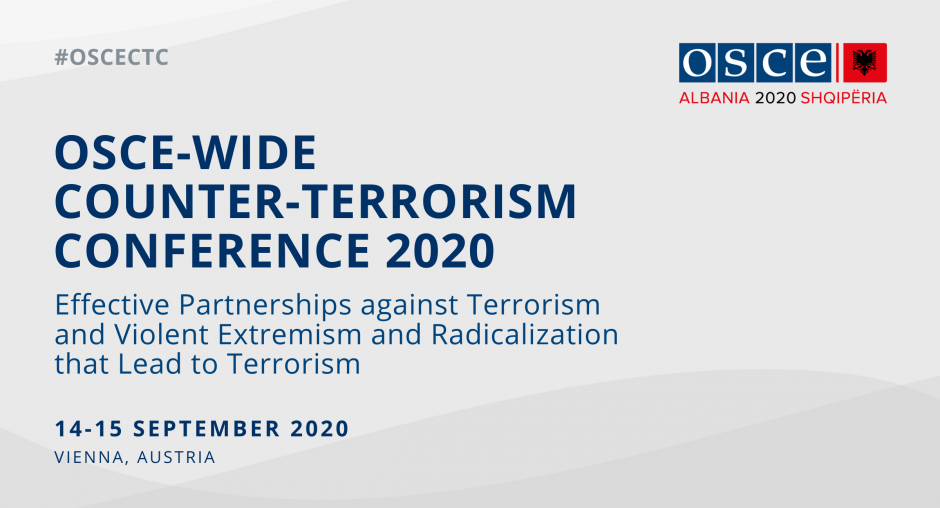Partnerships between governments, civil society and private sector crucial to counter-terrorism efforts, concludes OSCE-wide Conference

VIENNA, 15 September 2020 – We need to strengthen partnerships between governments, civil society and the private sector in efforts to prevent and counter violent extremism and radicalization that leads to terrorism (VERLT), participants of the 2020 OSCE Chairmanship Counter-Terrorism Conference concluded at the end of the two-day meeting in Vienna today.
This year’s annual OSCE-wide Counter-Terrorism Conference, organized by Albania’s 2020 OSCE Chairmanship with the support of the Action against Terrorism Unit of the OSCE Transnational Threats Department, brought together more than 500 participants from across the OSCE area.
High-level representatives and experts from governments, state agencies, the United Nations (UN) and other international organizations, representatives from the public and private sector, and civil society, including women’s rights organizations, and academia joined two days of dialogue and mutual learning. Together they shared their good practices and lessons learned and explored ways to strengthen effective partnerships in the fight against terrorism.
In his opening address on the first day of the conference, Albania’s Acting Minister for Europe and Foreign Affairs Gent Cakaj said that preventing and countering violent extremism and terrorism is a bigger team effort: “Advancing public-private partnership, international co-operation and solidarity is key.”
“Community, religious and civil society partners are better plugged in at a grassroots level than we are,” said Cakaj. “We must recognize that the private sector has capabilities and resources, be they technological or physical, that can amplify our efforts and deliver our strategies. That academia and think tanks have additional expertise and insight to spot trends. As governments, our fight against terrorism will be that much stronger with such effective partnerships.”
“Terrorism will never win,” he added. “Our governments and societies will never yield in the face of such attacks. Instead, it just strengthens our resolve to prevent and counter this hateful phenomenon.”
Also speaking on the first day, Vladimir Voronkov, UN Under-Secretary-General and Head of the UN Office of Counter-Terrorism, noted: “Defeating terrorism will not be possible through government or international organizations efforts alone. We need an inclusive whole-of-society approach. Public-private partnerships, particularly with technology companies, are essential to address the misuse of information and communication technologies by terrorists.”
He was followed by UN Special Rapporteur on the Protection of Human Rights while Countering Terrorism, Fionnuala Ní Aoláin, who, in a keynote address said: “We must look beyond the symptoms of terrorism”. Stressing the importance of addressing the root causes of terrorism and violent extremism, she said it is crucial “to ensure that all of our efforts are firmly rooted in human rights-based approaches and mutual trust”.
In her closing remarks today, Tuula Yrjölä, OSCE Officer-in-Charge/Secretary General, Director of Conflict Prevention Centre summarized the Conference’s key outcomes, noting that “Only through co-operation and co-ordination at all levels – nationally, regionally and internationally – can we address the multifaceted threat of terrorism and violent extremism in an effective and human-rights compliant manner.”
Over the course of the two days, the conference explored international and regional co-operation on counter-terrorism matters; multi-agency co-ordination at the national level to address terrorism and violent extremism; and the importance and added value of effective partnerships with a broad spectrum of stakeholders in preventing and countering violent extremism.
Seven side events organized by OSCE participating States, the OSCE Office for Democratic Institutions and Human Rights (OSCE/ODIHR), and partner organizations such as the UN Office on Drugs and Crime (UNODC), and civil society organizations from different regions across the OSCE area were held.
Due to the current COVID-19 pandemic, the conference was organized in a blended format, with participants and speakers attending in person as well as online.
